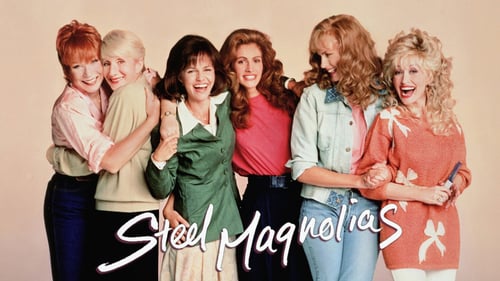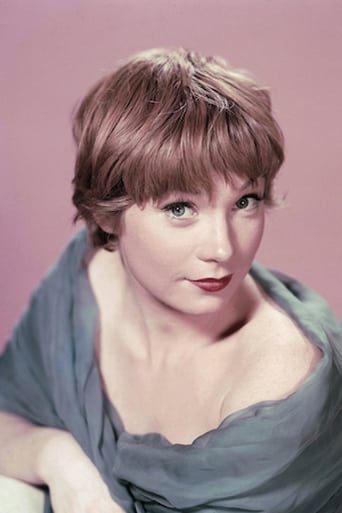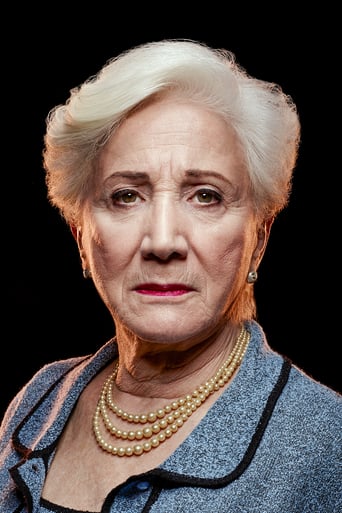lasttimeisaw
Based on Robert Harling's play, which is inspired by his own life story, the film version of STEEL MAGNOLIAS is directed by the schmaltz-brewing old-timer Herbert Ross. Emboldened by a pronounced female-centred cast, its narrative gaily situates in a Louisiana parish, where a palsy- walsy clique of (all-white) residents builds up rapport and strong support during the twist of fate, befalls the central Eatenton family.The film starts from the perspective of an outsider, an gauche young woman Annelle Dupuy (an uglified Hannah) arrives in town on the wedding day of Shelby (Roberts), the eldest daughter of M'Lynn (Field) and Drum Eatenton (Skerritt, a delightful comic relief), to work for Truvy Jones (Parton) in her beauty salon. Soon it turns out that Shelby suffers from type 1 diabetes, which implies that pregnancy will subject her life into great danger. If the couple wants children, adoption might be a wiser option, but no, that never gonna happen, Shelby is opinionated in her regressive determination to have a child of her own with a side-note faintly insinuates that perhaps, it is also what her husband Jackson (McDermott) wants despite the huge risk, their marital undertow only alluded during the women folk's regular saloon gossip, and any slant from their opposite sex has been maximally sidestepped (the original play has no male characters in the plot), and Jackson evidently doesn't come off as a model husband, but what comes to fore is the relationship between M'Lynn and Shelby, a mother's completely-selfless affection to her daughter (including donating one of her kidneys) Vs. a young woman's death-defying conviction to become a mother on her own term (latently also to ameliorate her marriage snag), although in hindsight, the latter descends to borderline injudiciousness, but quite tallies with the ethos of its time.Thankfully there are more upbeat subplots, which include a coruscating widow-duo, a graceful Clairee (Dukakis), once was married to the late former mayor, and a cantankerous Ouiser (MacLaine, a salient transformation in her appearance to enhance her senility), they banter, change repartee, bicker, make up, both are sprightly and wonderfully larger-than-life; whereas Annelle also says goodbye to her own troubled past, and finds solace in religion and soon a new husband with a baby on the way; only the relation between a generically spirited Truvy and her offish hubby Spud (Shepard) doesn't pan out effectively in the final product.STEEL MAGNOLIAS is a springboard to leapfrog Julia Roberts into stardom, earns her the very first Oscar nomination at the age of 22 over the more prestigious distaff thespians, still, how can one not be petrified to watch Field's mind-blowing flare-up in the cemetery one-take and in the next second, not get wryly bemused by Dukakis' off-kilter humor to swerve the mood back from abysmal heartbreak? According to my book, a more Oscar-deserving supporting player is the consistently fiery MacLaine, a recalcitrant rebel and nothing can hold her back! By contrast, a dewy Robert only outshines others by design in her one-off diabetes attack sequence.In all fairness, this female-skewing small-town melodrama hits the right spot as a life-affirming motion picture which appeals to a much more overlooked demography, but it is also stalled by its morally provincial material and a slightly over-honed happy-clappy tone to some extent.
ElMaruecan82
Embracing women's eagerness to spread and comment about gossips, "Steel Magnolias" is extremely fertile in witty one-liners and wisecracking exchanges, yet the simple 'life goes on' emerges as the most powerful line, summarizing the very spirit that drove the six ordinary heroines of a small Southern town. You know these towns, where handy jobs are the rule, where rituals and ceremonials regularly punctuate the daily routine, towns with postcard-like charms associated with folk songs and country music, French sounding names for Southern belles and plain monosyllabic ones for guys.The set is tone through the setting: "Steel Magnolia" is a woman's movie, where men (more an observation than a critic) are foils, or tender non-entities highlighting their women's wisdom, patience and endurance. Tom Skerrit does pretty well though given the small role he has, stealing the show as a lovable buffoon of a husband. And closing the man's parenthesis, I wonder if the films most emblematic line "what differentiates women from animals is their capability to accessorize" didn't include men as parts of these accessories. Still, this is feminine speaking, not feminist, and the difference is huge.Indeed, if one thing, "Steel Magnolias" is an ode to female bonding, contradicting the myth of friendship as exclusively masculine. Still, it fairly deals some inconvenient truths notably women's adoration for gossip and benign superficiality. After all, isn't it significant that the arena of their fullest expression is a beauty parlor? The place is owned and managed by the sunny and lively Truvy (Dolly Parton), who hires a newcomer in town, a shy and lanky girl with eyes hidden under a pair of heart-rimmed sunglasses: and whose reluctance to answer basic questions immediately label her as a 'girl with a past', and while you'd expect her new circle to respect her discretion, they surprisingly display more curiosity.The rest of the group includes Julia Roberts as Shelby and her mother M'Lynn played by the quintessential strong-willed and hard-working mother: Sally Field. If the six women represent the community-within-the-community, the group's heart lies on the mother-and-daughter bond. When Shelby is victim of a diabetes attack, she's immediately healed by her mother; M'Lynn knows the process and doesn't panic while giving her orange juice. The signal is clear: this is the part of the story that will matter, starting with the new chapter on Shelby's life: her marriage, a convenient opportunity to introduce all the protagonists -a never-failing plot device since "The Godfather".And "Steel Magnolias" cleverly uses rituals and holidays as narrative check-points. During Xmas, Shelby announces her pregnancy to M'Lynn, which comes as a shock: because of her health condition, pregnancy was medically frowned upon. Yet Shelby can't do without experiencing motherhood, especially since adoption didn't rhyme with option. M'Lynn is immediately confronted to a heart-breaking paradox: as a mother, while she doesn't understand her daughter's action, she understands her motivations. "I don't know what I want" is the most sincere answer she, and any mother, could have come up, with. Anyway, the news are celebrated by the titular magnolias in a sort of "Que sera sera" resignation.Yet the health threats keep us on-guard, even after moments of reliefs. Shelby has a boy, but as we expect, her health keeps worsening. "Steel Magnolias" remind of "Terms of Endearment" on that level, and driven by a similar spirit, it effectively compensates these dramatic moments by comedy, incarnated by the Laurel-and-Hardy-like duo of Olympia Dukakis and Shirley MacLaine. Both are widows, MacLaine twice, one embraces life with a theatrical joviality, the other is your typical grumpy old women, MacLaine even borrows some mannerisms and mimics from her Aurora role in "Terms". The two elderly women are the salt and pepper that give the film its unique flavor.So "You'll laugh, and cry... and meditate about life", sounds like the predictable premise of "Steel Magnolias". And it works because Herbert Ross, the director and Robert Harling, the writer never cheat with this premise through over-elaborated plot devices, even I, was surprised by its straight-forward path to the tragic conclusion. It doesn't cheat either because there are many moments that could have easily drown in sentimentality. Not that every comical effect didn't feel awkward, but it takes some guts not to insist too much on emotions in a woman's film. Naturally, the "Terms of Endearment" comparison indirectly reflects the film's lack of narrative ambition, but from my own experience, since the night I saw it 20 years ago, I can't look at "Steel Magnolias" with cynical eyes.Yes, the magic still works, and the poignancy is amplified by genesis of the play that inspired the screenplay. I learned from the DVD features that the writer wrote the play to cope with the loss of his sister, who died in the same circumstances as Shelby, which makes the film's context and truth-to-life more palpable. Another reason to appreciate the film is to wonder, how differently handled it would have been today. The film is set in the 80's, and whatever it means, at least, we don't have a struggling wife trying to awaken the sexual beast, the mother courage with five kids, including a Gothic teenager who wants a Scorpio tattoo, no lesbian kiss or pot-smoking scene either. "Steel Magnolias" rise above these target-appealing considerations: it's about a breed of women that doesn't exist anymore, so much more appealing than the likes of "Sex and the City" or "Desperate Housewives"."Steel Magnolias" is about the joys and pains inherent to women, giving life being their greatest blessing and curse given the circumstances, and the film deals with both. It's about the exhilaration of being a woman capable to transcend its innate toughness despite their vulnerable facade. And I guess, I remembered the "Life goes on" line more than any other because it sums up what being a mother means: transmitting life's precious sparkle, the same that inhabit their hearts, their eyes, and in some cases, their talkative mouths.











